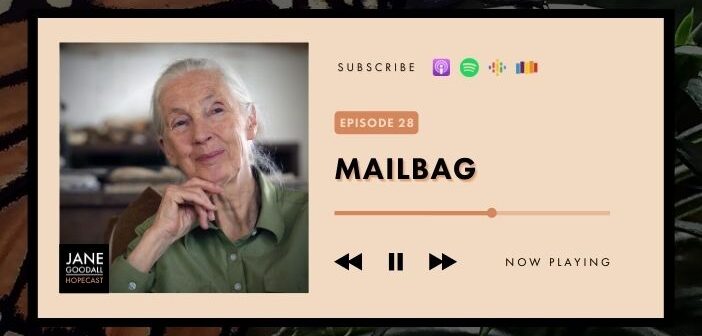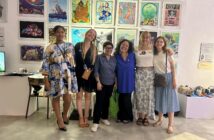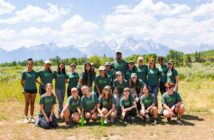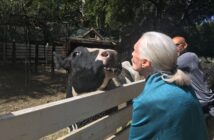Full Transcript:
Speaker 1 (00:04):
We are all connected. All our voices matter. And it will take all of our pooled talents and strengths to create a healthier planet.
Speaker 2 (00:12):
Our mother, our one and only home.
Speaker 3 (00:14):
I aspire to change the world too, because of the hope she gave me.
Speaker 4 (00:17):
The Earth is beautiful.
Speaker 5 (00:18):
She devoted her life to this.
Speaker 6 (00:20):
Together, we can save the world.
Speaker 7 (00:24):
Together we can. Together we will.
Dr. Jane Goodall (00:24):
What is your greatest reason for hope? I’m Jane Goodall and this is the Hopecast.
Dr. Jane Goodall (00:33):
Hello, this is Jane Goodall. I’m really happy to introduce a new series of mailbag submissions. And our very special mailbag opener for this session is a very old and wonderful friend of mine, Ruth Mendelson, who’s been helping JGI for as long as I can remember. Ruth, welcome, and now get to your work of opening these submission.
Ruth Mendelson (01:03):
Well, thank you so much, Dr. Jane. And I love you, and it is so cool to see you, and what an honor to be a mailbag opener. So thank you so much for the invitation.
Ruth Mendelson (01:14):
Okay, Dr. Jane, first up we have Isabella [inaudible 00:01:18]Ortiz. You are 14 years old from Bogota, Colombia, and has big dreams for animals and the planet.
Isabella (01:31):
Hi, my name is Isabella [inaudible 00:01:33]. I am 14 years old. I am from Bogota, Columbia. About two years ago, I learned about Jane, about her hard work to recognize and help solve environmental problems as important as the loss of the biodiversity or the damage of the pollution and how it increases global warming.
Isabella (01:49):
But I think one of the most important things that made me realize, Mr. Goodall, is that you simply did take intention to help solve a problem no matter how old you are or where you live. Simply if you care about animals or climate change, you can make a difference and that is worth a celebration.
Isabella (02:04):
So thank you for that inspiration, Mr. Goodall. In my case, you or she inspires me to be a biologist and very long in the future because I just want to help animals. And I think that it’s much, I have lot of things to do for them. I think I am a combination of dreamer and makers in central. I have big dreams to help the planet and the animals, but at the same time, I think that making contributions, even in small sections, can make a difference and could improve and save this planet we call home.
Dr. Jane Goodall (02:45):
Well, hello, Isabella. And I’m really happy to hear that you care about the environment and want to help animals. Let me share with you the advice that my mother gave to me. I was a dreamer and I dreamed of going to Africa when I was 10 years old. And everybody laughed at me except my mother, who said, “If you really want to do something like this, you’re going to have to work awfully hard, take advantage of every opportunity and if you don’t give up, you’ll find a way.”
Dr. Jane Goodall (03:14):
So as you get older, you’ll suddenly find this is exact what I want to do, but start off joining Roots & Shoots and doing small things to help the planet every single day, to help the environment, to help people, to help animals. A part of Roots & Shoots, you’ll meet lots of other young people who feel just like you and you can discuss what you care about with them and keep an open mind. And then at a certain point, you’ll know exactly what it is that you want to do. So good luck to you.
Ruth Mendelson (03:50):
That’s beautiful, Dr. Jane. So next up, we have Katie Parker from the UK who seeks your advice, Dr. Jane.
Katie Parker (04:03):
Hi, my name is Katie and I’m from the UK. I’m currently studying wildlife conservation at the University of Kent. I would love to know, do you have any tips for making it in the conservation sector and how to have a career successful as you as making as big as impact as possible in the world? Because in the future, I would really like to have a career in helping promote positive change in action within the world.
Katie Parker (04:26):
Thank you so much for this podcast. It’s really given me so much hope over the last years. And you’ve been a massive inspiration for me to carry on this path in the conservation sector. Thank you so much for everything you do. Katie.
Dr. Jane Goodall (04:39):
Well, hello, Katie. You know, I think the most important thing these days is that we try to do something every single day to make a difference in our own lives. The choices you make when you go shopping, do you ask questions like, “When this product was made, did it harm the environment? Is it cheap because of unfair wages or because of some kind of forced labor? Was it cruel to animals like meat from factory farms?”
Dr. Jane Goodall (05:11):
Keep an open mind as you go through the next few years. Maybe you care about waste. Whatever it is, you’ll suddenly realize this is it. And then you work out what to do. You learn as much as you can about it. And that’s your career ahead of you. But if you make some decision and then find that you’ve made a mistake and there’s something else you feel is more important, don’t be afraid to change. That’s not a sign of weakness. It’s a sign that you are thinking things through and undertaking something that you have the competency to pursue. Good luck to you.
Ruth Mendelson (05:51):
That’s brilliant, Dr. Jane, and thank you so much for the reminders that we all have the power to think for ourselves and change our minds when we need to. Next up, we have Ava [Krupa 00:06:03] who is a visionary regarding education.
Ava (06:10):
I believe that taking actions should start in and around our own home. I’d like to see children start learning languages at an early age. I’d like to see blooming education systems in developing countries. I’d like to see bilingual generations being able to communicate with each other. Dr. Goodall showed me that age doesn’t matter when it comes to protecting our environment. I became a kindergarten teacher. I think the best word for our planet is innocent.
Dr. Jane Goodall (06:42):
Well, Ava, that’s very interesting thoughts that you’ve expressed there. I think the idea of learning languages when your children are young is absolutely the way it should be. Young children seem able to just jump from one language to another. And I have to tell you, I would’ve been fluent in French if my parents had had their way. They wanted me to learn French because we’ve got some French ancestors in our blood. So they took a house in France and I was going to live there for about two years and learned French.
Dr. Jane Goodall (07:18):
However, World War II began. We’d been there only three months and we had to leave, but there’s one other thing that’s really, really important for young children and that’s a lot of outdoor education. It’s only when you are curious about something, you want to find out more and then you realize how fascinating nature is and then you learn to love it and you want to protect it. And all of that, we try to do in our Roots & Shoots program.
Ruth Mendelson (07:51):
Thank you so much, Dr. Jane, I loved what you had to share in regards to curiosity, which speaks directly to what Ava was saying about the earth being innocent. Next up, we have [Anabella Papa 00:08:05] from Argentina, who started a really cool project.
Anabella (08:14):
Dr. Jane Goodall inspired me to become an activist for animals and for climate change. And also because of her, I met two beautiful people with which I started a project called [inaudible 00:08:27]. And it’s about farming a seed and taking care of it until it’s a little tree apt to be planted in a wetland that has been destroyed by an intentional fire here in Argentina. Jane Goodall also taught me to never those hope because it all starts with a little change.
Dr. Jane Goodall (08:48):
Thank you for that question and your idea of restoring degraded land with trees is a wonderful idea because trees absorb carbon dioxide from the atmosphere and they give us oxygen. You hit the nail on the head when you said you take a little seed and you nurture it.
Dr. Jane Goodall (09:09):
You talk about the fires that have been intentionally started in Argentina. It’s usually to make pasture for cattle or to grow crops. And what’s interesting about fire is that, in some areas, trees have become used to, during evolution they become used to fire. They are able to regenerate after the fire and their seeds, as long as the fire isn’t too hot, can still grow.
Dr. Jane Goodall (09:37):
In fact, some seeds need fire in order to start germinating. How resilient nature is. Give nature a chance, perhaps a bit of help and nature will come back. That’s one of my great reasons for hope.
Ruth Mendelson (09:54):
It’s just incredible, the resiliency of nature and that we do have a part in terms of really researching what are the appropriate seeds in the right area and how to lovingly care for them once they’re planted. Next up, we have Louise [Denni 00:10:09], who’s all about education.
Louise (10:16):
I believe that education is going to be the best way to help with climate change. There are so many corporations and world leaders that are not following the science. And also, with messages of gloom, people don’t want to change their lifestyles. So they see the message as being an inconvenience. We need to get people power. We need to get buying power to put pressure on world leaders and governments.
Louise (10:44):
The messages that people like Jane put out, they are tireless, they’ve done this all their lives, which has prompted me to keep going and keep campaigning. I can’t do much from where I am, but I do petitions and I support all of the English nature as much as I possibly can. But really education is where it’s at.
Dr. Jane Goodall (11:04):
Well, thank you for that. And yes, education is important, but we need to tell stories. We need to get their hearts involved. If you just educate the head and you forget about the heart, which is love and compassion for other living things, then people don’t really change. They may say they do.
Dr. Jane Goodall (11:27):
So the most important thing is for people to understand that they, as an individual, matter. They, as an individual, have a role to play and they make a difference every day. What is really important is to alleviate poverty. Because if you are really poor, you can’t make the ethical decisions that we can make as to what you buy, where did it come from, how was it made, did it harm the environment, people or animals? You just have to buy the cheapest in order to survive.
Dr. Jane Goodall (12:02):
So alleviating poverty is one side of the picture. Reducing our unsustainable demands on the natural world, the finite resources of the natural world, is another. And then how important it is to change politicians. And if we’re in a democracy, we have the power of the people to vote for those politicians who do care about the environment, those politicians who do care about the right kind of education.
Dr. Jane Goodall (12:35):
So there’s an awful lot as an individual that we can do. And it may seem a small little thing, but when there’s millions of people making small ethical decisions, then we start seeing a better world. So thank you for your comments.
Ruth Mendelson (12:53):
That is beautiful, Dr. Jane, and it reminds me. I’m an educator myself. I’m a college prof and I’m always talking to my students about how there are two types of education. Education for a living and education for life and both are necessary. Education for life. Love, compassion, just what you were saying, Dr. Jane. The cultivation of the heart to care. It’s one of the most significant pieces of education that we can impart. Next up, we have Jenna [Pacini 00:13:36] from the UK who has been inspired by you, Dr. Jane, as both a scientist and a speaker.
Jenna (13:45):
Hi, I am Jenna Pacini. I am a vet student at the University of Surrey in the UK. I believe that working together on the human animal interface towards a durable co-evolution is key to preserving our planet. My one word rule in bettering this planet is speaker.
Jenna (14:03):
I hope that people will learn to understand one another in order to work together, to find a balance between preservation of human societies and the natural word. Over the years, Dr. Goodall has been a great source of inspiration for me, both as a scientist and a spokesperson of the natural word. As a vet student, I started the vet radio show talking about common issues surrounding the animal word with vets and professionals. My one word to describe our planet is treasure.
Dr. Jane Goodall (14:32):
Well, thank you, Jenna. And it’s quite amazing the number of vets students that I’m meeting or hearing about who are truly making a difference, understanding that we actually are part of the natural world. Some people think we’re separate from it, but we depend on it. We depend on it for everything. For air, for water, for food, for clothing. Even in the middle of a city, we depend on Mother Nature.
Dr. Jane Goodall (14:59):
But what we depend on is healthy ecosystems. An ecosystem is made up of a complex interrelationship of plant and animal species in that area. It’s like this beautiful web of life and as a species becomes extinct, well, we learn that each one has some role to play even if it’s small and insignificant and a thread is pulled from that web of life until the web hangs in tatters and the ecosystem collapses.
Dr. Jane Goodall (15:33):
As a vet student, you must know about the one health approach where we say that the health of us as humans depends on the health of the environment and the health of our animals that surround us, whether they’re wild or domestic. And this is where vet students can play a very important role.
Dr. Jane Goodall (15:55):
There are a lot of young people going into veterinary medicine who do internships in zoos and this gives them a wonderful opportunity to learn how to treat exotic animals. And they’re taking that knowledge, they’re helping veterinarians working in wildlife sanctuaries. We have veterinarians at Gombe who treat the chimpanzees if they’re sick.
Dr. Jane Goodall (16:19):
We need to understand that we’re not the only animal on the planet who’s sentient and has emotions like happiness, sadness, fear. And of course they all feel pain. So good luck to you in your veterinary studies. And I shall like to hear what it is you end up doing when you finish with vet school. Thanks.
Ruth Mendelson (16:46):
Thank you, Dr. Jane. May we all be as awake and caring and courageous and expressive as you. Thank you so much.
Dr. Jane Goodall (17:06):
Well, Ruth, I want to really thank you for being our official mailbag opener today. How did it feel to open mail from these amazing people from around the world?
Ruth Mendelson (17:19):
It was incredibly cool. And thank you so much, Dr. Jane, for inviting me to be a part of this. It was very inspiring to me. It was inspiring to hear the comments and the questions. It was very inspiring to hear your responses and it just reinforces my conviction to be a part of the solution.
Ruth Mendelson (17:41):
So thank you so much everybody who’s a part of this, including the tech team that’s even making this recording possible. Because as always, it takes a number of people. It’s not just only who you see or hear right up at the front. There’s all kinds of people working behind the scenes to help make this happen. So thank you so much. I feel very, very inspired and very grateful to be on the planet at this time to do my part. Thank you.
Dr. Jane Goodall (18:11):
Feel hopeful and inspired to act with the Jane Goodall Hopecast by subscribing on Apple Podcasts, Spotify, Stitcher, Google podcasts and anywhere podcast are found.
Dr. Jane Goodall (18:29):
I’m your host, Jane Goodall. The Jane Goodall Hopecast is produced by the Jane Goodall Institute. Our production partner is Frequency Media. Michelle Corey is our executive producer. Enna Garkusha is our producer and Matthew Ernest Filler is our editor and sound designer. Our music is composed and performed by Ruth Mendelson with additional violin tracks from Angie Shear. Sound design and music composition for the conservation chorus is by Matthew Ernest Filler.






